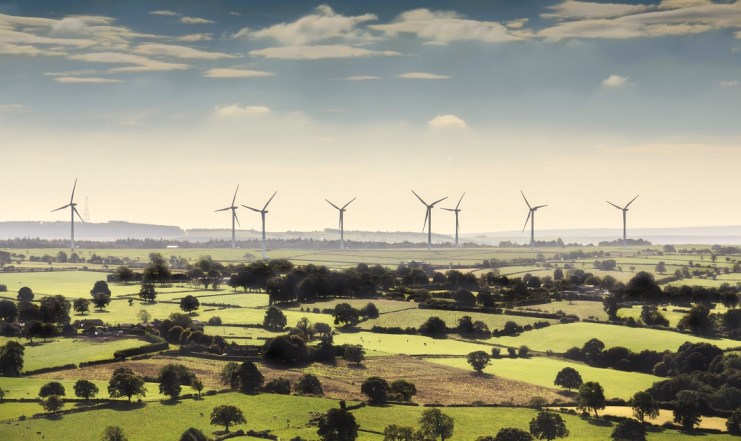Don’t want to be an American Idiot: How the UK can make the most of ‘Green Day’ as energy arms race hots up

A green energy arms race has begun, and the UK is at risk of lagging behind its rivals – a clear crisis when the country’s energy security and climate goals are at stake.
The government is now set to unveil ‘Green Day’ later this week in response to the US Inflation Reduction Act, with President Joe Biden pledging a vast subsidy package of $368bn for low and zero carbon energy projects in September, the largest ever package geared towards environmental spending.
Meanwhile, the EU is currently outlining plans for its own Green Deal Industrial Plan – with the bloc considering loosening state subsidy rules and removing red tape for clean technology firms.
In such circumstances, the UK’s renewables sector has urged the government to respond robustly, with multiple firms across burgeoning sectors of the green energy sector warning they will have to reconsider domestic plans and look for opportunities overseas if the investment climate is not matched in this country.
Hunt warned last month the UK can’t match the US pound-for-dollar with new subsidies, but that there would be a strong response – the details of which are mostly unclear four days out from the rumoured announcement day.
City A.M. has made its own six-point plan to keep the UK on a strong footing with its rivals and ensure a strong investment climate for its clean energy goals.
1) Fail to fix planning, plan to fail
Time is of the essence for reaching the UK’s energy ambitions, and onshore wind can be set up cheaply, quickly and with minimal logistical challenges – if the government is bold enough to engage in serious planning reform and lift projects out of a de-facto moratorium. Intransigent localism has caused regional MPs to lose their mettle, but the government is hoping to reform the UK’s planning framework. Industry body Renewable UK warns that current proposals are little more than tinkering around the edges, and that it is time the government brought new wind turbine developments in line with other infrastructure projects. We agree.
2) Make the grid competitive for energy projects
Octopus boss Greg Jackson has consistently highlighted that National Grid has been a persistent obstacle to the green dreams of energy developers. While it can take less than a year to do the engineering work for a wind farm, it can then take six or seven years to get permission to connect to the grid – which has received a huge increase in connection requests amid the surging interest in electrification and renewable projects. It is time to consider contestable grids where connections do not have to be overseen by a central body and can instead be fielded out by regulated contractors.
3) Scrap the renewable levy and bring in CfD’s
The Electricity Generator Levy – an effective windfall tax on green energy projects – is politics rather than policy, seemingly made in an attempt for fairness after the crackdown on North Sea oil and gas. The £14bn estimate for revenues raised over the next five years is optimistic at best. It is time to restore investment confidence in the sector with a contracts for difference (CfD) style arrangement with legacy operators – to reassure companies retrospective taxes made on investments will not be utilised by the government again. CfDs are one of the UK’s true success stories, delivering low carbon deployment at low cost to consumers. This means when wholesale electricity prices are higher than the price agreed in the CfD, generators pay back the difference.
4) Go nuclear, and roll out SMRs
As much as idealists pretend otherwise, the UK needs to establish a low-carbon baseload of energy. Wind and solar are intermittent, and green hydrogen remains a gamble with its high production costs. Nuclear is the clear answer here in the pivot away from gas but with EDF’s hulking projects draining the taxpayer dry it is time for a nimbler response. If the government is to allocate further taxpayer funding, it should really be towards small, modular reactors (SMRs), which can be built at scale with extensive production lines.
5) Back the future energy pioneers
The UK has been a leader in exciting technologies and developments over recent years such as clean energy storage, semiconductors and carbon capture. However, it has persistently struggled to shepherd such technologies from early stages to mass production. Grants and a low tax environment are essential for boosting future winners that could reap dividends for the UK’s green industry.
6) Treat fracking fairly
No one likes to admit it, but we need gas. We will need gas for decades to come. As it stands, our policies towards fossil fuels are utterly incoherent. The UK is happy to ship in carbon intensive LNG imports – typically made from US fracked gas – which are unlikely to be eligible for blue hydrogen conversion. Yet, the solution for lower-carbon, domestic gas resources could be under our feet. The fracking industry has not asked for public funds, and there is no harm in allowing them to do testing at designated sites to assess the UK’s potential supplies.